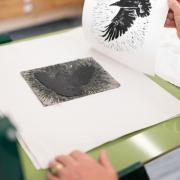As Prince Harry and Meghan Markle’s big day draws closer, Rebekka O’Grady looks into the royal family’s historic relationship with rare Welsh gold wedding bands.
‘It’s one of the most romantic stories and it lends Clogau almost a mythical or fairytale history that no other jewellery brand could offer,’ says Ben Roberts, managing director of Clogau. ‘The links between the royal family and Welsh gold go back as far as 1911. Clogau has supplied the gold for each generation’s wedding rings since then.’
Welsh gold is particularly rare and originates from the Clogau St David gold mine in Dolgellau, Gwynedd, in North Wales, which is no longer in operation. Members of the royal family have used the gold to create their weddings bands since the tradition was founded by the Queen Mother, then Lady Elizabeth Bowes-Lyon, on her marriage to the Duke of York on April 26, 1923.
Since then every major royal wedding – including Princess Margaret’s marriage to Antony Armstrong-Jones in 1960, Lady Diana Spencer and Prince Charles in 1981, and the most recent of Catherine Middleton to Prince William in 2011 – have used Welsh gold wedding rings. HM Queen Elizabeth’s wedding ring, from her marriage to The Duke of Edinburgh in 1947, is crafted from a nugget of pure Welsh gold from the Clogau St David’s gold mine.
‘The very fact that rare Welsh gold is favoured by the royal family and its limited supply makes pure Welsh gold one of the most expensive metals in the world,’ says Ben, who is the second generation to run Clogau, which was founded by his father William after he discovered the abandoned gold mine in the mountains of Snowdonia in 1989. ‘A recent auction witnessing the sale of Welsh gold nuggets from the Clogau mine fetched values of circa 25 times the current gold market value.’
Despite the mine now being closed, the rare Welsh gold is still contained within each piece of Clogau jewellery, and can be identified by the Welsh dragon stamp. Ben says that, as a business, they are still sitting on significant reserves from when they were actively mining the Clogau St David’s mine. ‘It’s these reserves that are depleting on a yearly basis as we add a small amount of the precious metal to each and every piece that we create.’
Of course there is no definitive answer just yet as to whether Prince Harry and Meghan Markle will use Welsh gold in their wedding bands when they tie the knot at Windsor Castle on May 19th, but it’s hard to see a near century-long tradition being broken. ‘We would be thrilled if the couple decide to use Welsh gold and it would be great to see the tradition continue,’ says Ben.
As for members of the public, they too can have a piece of history on their wedding day thanks to one Clogau jewellery range in particular. ‘The Windsor collection forms part of our bridal offering,’ Ben explains. ‘Of course, the name Windsor was used to symbolise our links with the Royal family and this special wedding ring story.”



























